The headlines
- In 2022 rePurpose Global recovered over 23 million lbs (over 10.5 million kgs) of plastic waste from nature.
- We did this through 13 impact projects that operate in 6 countries, across 4 continents.
- Our work engaged around 2,000 waste workers in 2022 – providing them with additional income opportunities, safer working conditions, and more dignified livelihoods.
- These projects now facilitate waste management service support to 66 villages and 27 municipalities around the world.
- Three of out projects are based on a model of expanding waste management services to new areas, and since 2019 we have provided over 600,000 people with a holistic plastic waste management service for the very first time.
Introduction
Those are the headlines of rePurpose Global’s impact in 2022, but before hearing more detail, it is worth considering the ‘why’. Why is our mission to fight plastic waste so important? Here are a couple of questions to get you started:
Question 1: What percentage of plastic waste is recycled globally?
- 1%
- 9%
- 30%
- 45%
Answer: Around 9% of plastic waste is recycled globally.
As the production and use of plastic continues to escalate, recycling rates of plastic waste remain at less than 10%. Some plastic is incinerated and openly burned, but huge amounts of plastic are landfilled or just dumped. An estimated 85% of plastic packaging ends up in landfills or as unregulated waste. Dumped plastic often finds its way to the sea via rivers and streams, and
80% of all marine debris is made up of plastic. This is a huge issue 83% of consumers worldwide cite plastic pollution as a concern - making it the most common environmental concern for consumers.
Question 2: How many people still lack access to holistic waste management systems (i.e. including waste collection and processing facilities)?
- 900,000 (900K)
- 30,000,000 (30 million)
- 1,000,000,000 (1 billion)
- 3,000,000,000 (3 billion)
Answer: 3 billion people still lack access to holistic waste management systems. Without formal waste management systems, waste is often collected and recovered by an estimated 20 million informal waste workers who earn little from the waste they collect due to exploitative informal recycling markets.
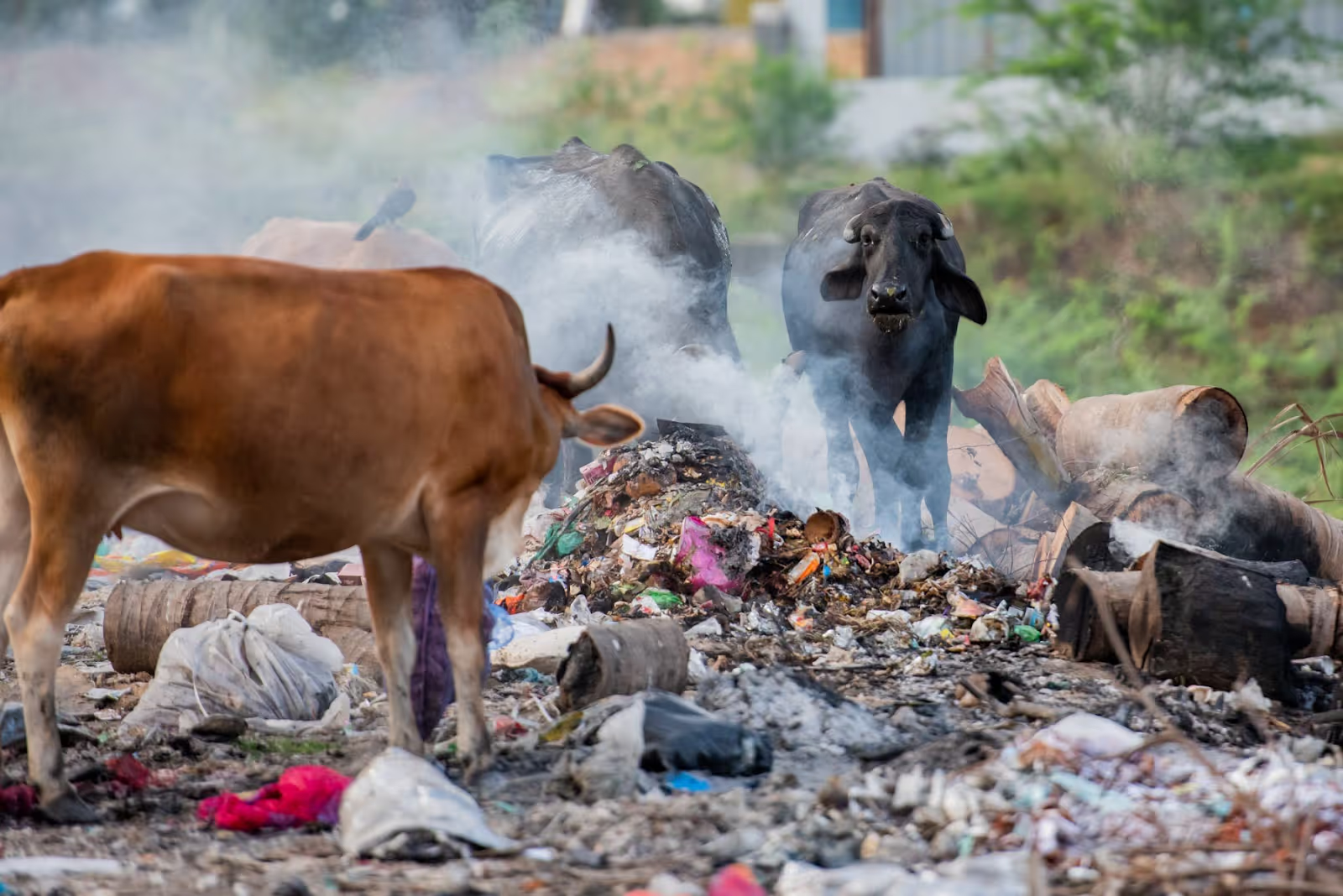
rePurpose Global acts to correct these inadequacies and injustices. We work to find solutions to waste management challenges, while fighting global plastic waste.
To do this, sustainable interventions are needed to address four critical gaps in the global waste management ecosystem:
- Waste management for community development – supporting and expanding waste collection services that provide fair incomes for waste collectors, and reduce pollution in communities.
- Infrastructure for hard to recycle items – ensuring that there are sustainable ‘end destinations’ for hard to recycle items (such as low-value, flexible plastics), and supporting innovations to recycle or upcycle them
- Infrastructure for recycling and reuse – developing infrastructure for recycling and reuse in areas where it does not yet exist.
- Recovering leaked waste from oceans and biosystems – taking steps to clean up legacy waste that is already polluting the natural environment.
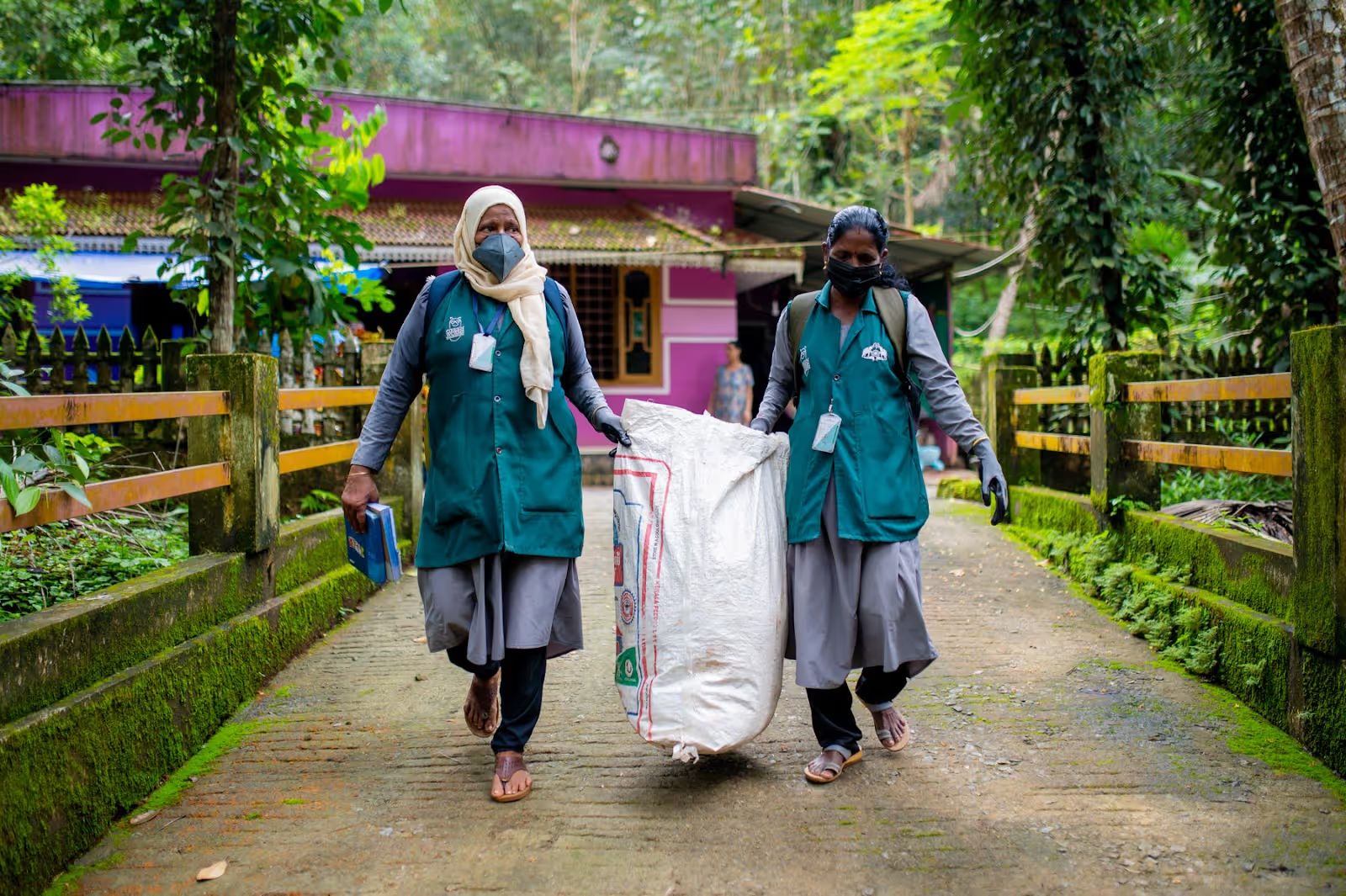
With this as a framework, rePurpose Global has developed a global network of recovery projects. Each project has its unique challenges, with different combinations of the four interventions required. What each has in common is that rePurpose Global’s funding helps to fix the broken aspects of the system and this results in ‘additional’ plastic waste being diverted from nature and appropriately recycled or recovered (more on what ‘additional’ means in a moment).
These 13 projects operate in 6 countries (with the recent addition of the Dominican Republic) across 4 continents.

2022: the big numbers
Across the 13 projects, over 23 million lbs (over 10.5 million kgs) of plastic waste were recovered from nature in 2022. That’s about the weight of 610 million plastic bottles.
Our work also engaged around 2,000 waste workers in 2022, providing additional income opportunities, safer working conditions, and more dignified livelihoods.
Combined, our projects facilitate waste service support to 66 villages and 27 municipalities across 6 countries.
Three of our impact projects introduced new household waste collections as a way of preventing plastic leaking into nature. This has meant that – as of the end of 2022 - we have now provided over 600,000 people with a holistic plastic waste management service for the very first time.
As mentioned above, all of our projects run with the rePurpose Global's additionality promise: Every dollar invested in a rePurpose Global impact project goes towards recovering plastic that otherwise would have ended up in nature.
‘Additional’ means that this volume of plastic would not have been recovered without the intervention, it is ‘additional’ to business as usual, and prevents plastic pollution.
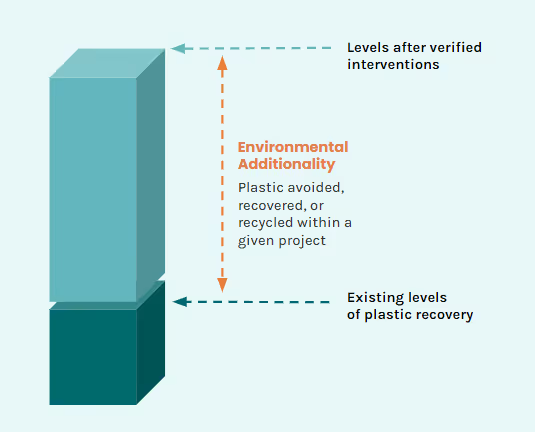
We choose some of the most vulnerable ecosystems for our interventions, to help protect nature. We also focus on scaling the most unprofitable parts of the waste management value chain.
Let’s have a look behind these headlines, and focus on some of the projects in more detail.
Project Hara Kal
(Hindi हरा कल: Green Tomorrow)

Our journey starts at project Hara Kal in Kerala, India.
The state of Kerala generates 289.6 million lbs of plastic waste each year. An estimated 70-80% of plastic packaging is low-value (effectively unrecyclable) plastic materials such as flexible, multi-laminate packaging.
At the moment, only 3% of plastic waste generated in Kerala is collected sustainably. With no collection systems, waste ends up in unmanaged landfills, or is burned or dumped by households. As a coastal state, this – unfortunately – leads to ocean runoff and marine plastic pollution.
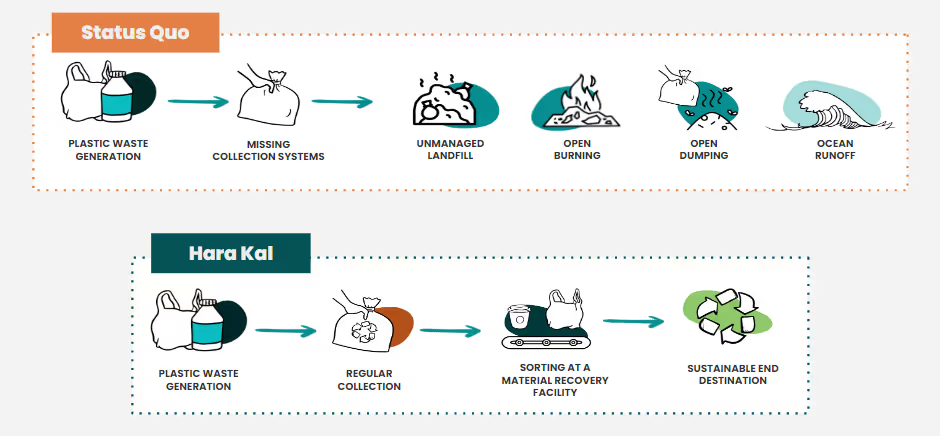
With rePurpose Global’s interventions, 2022 saw some big environmental and socio-economic achievements at project Hara Kal.
A total of 7.8 million lbs (3.5 million kgs) of ocean-bound plastic waste were recovered ethically through project Hara Kal in 2022. Our project engaged over 500 formal workers, who enjoyed improved working conditions, and received fair pay above the minimum wage.
Hara Kal is one of the projects where household collection was lacking. Thanks to rePurpose Global and our coalition, over 96,000 rural households (and over 400,000 people) in the region have been provided access to waste management services, since 2019.
That takes the total number up to 22 villages that have access to household collections, and are managing low-value plastics in a more environmentally beneficial way.
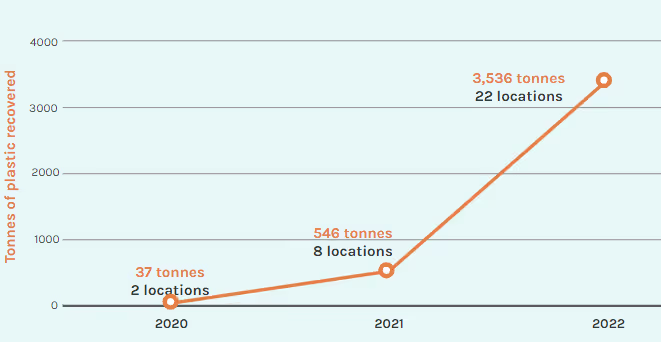
In 2022 we financed over 6 times more plastic recovery at Hara Kal in 2022 than we did in 2021, and this is a project we have plans to continue growing in 2023.
For more information on project Hara Kal, you can watch the following video: https://www.youtube.com/watch?v=i3e1H4njdD8
Project Sueño Azul
(Spanish: Blue Dream)
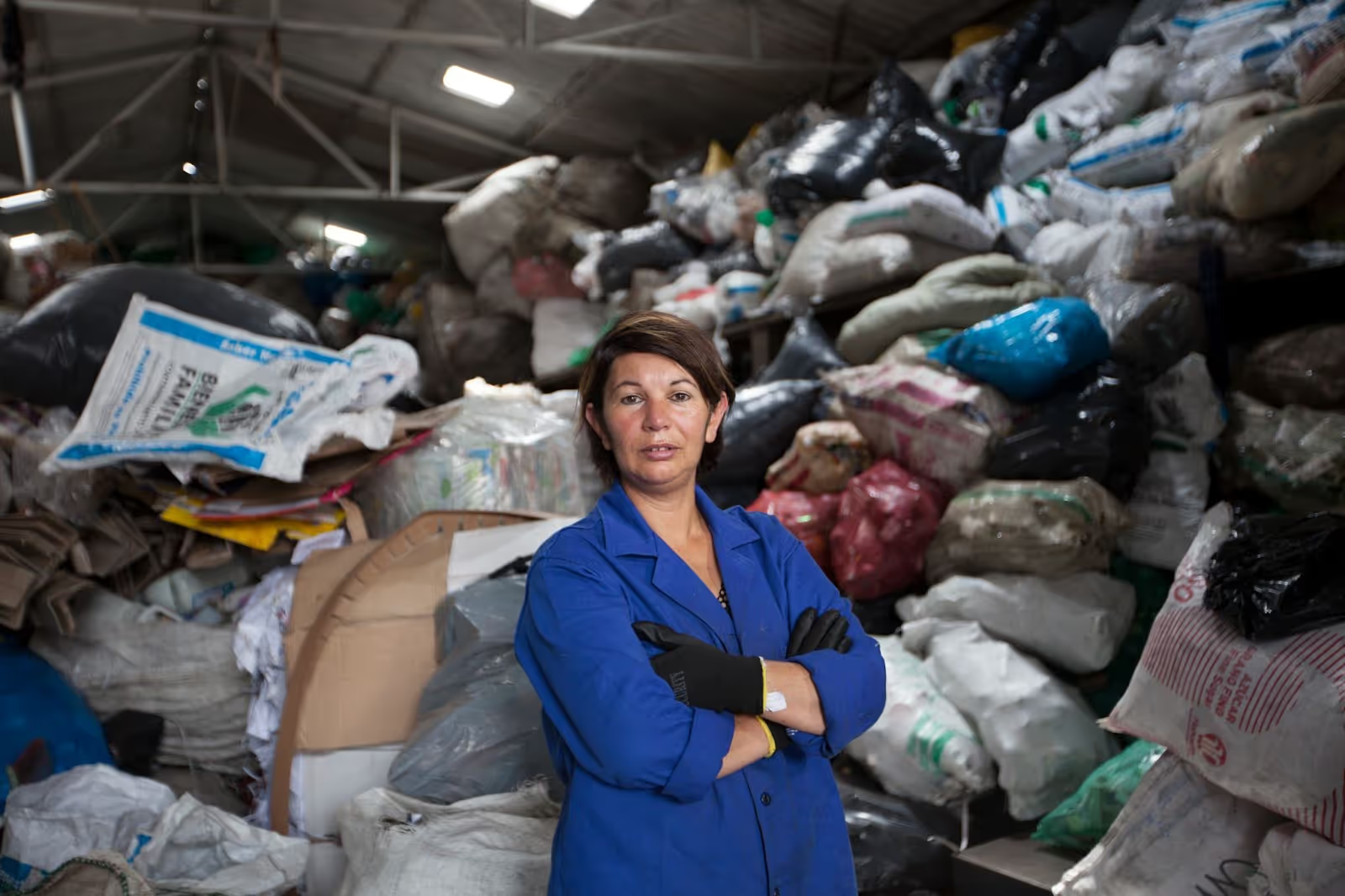
We continue our journey by hopping across to South America. rePurpose Global’s project Sueño Azul runs in partnership with the Association of Recyclers of Bogotá (ARB) in Bogotá, Colombia.
Around 450,000 tonnes of plastic waste are generated annually in the city. This equates to around 0.17 kg of plastic waste generation per person, each day in Bogotá (less than half of the amount used by the average US citizen).
There is a recycling rate of 14% for recovered plastics in Bogotá, and the flexible plastics that are collected as part of Sueño Azul would either be landfilled or burned without rePurpose Global’s financial incentivization.
In 2022 1,260 metric tons of low-value plastics were diverted from landfill through the project. A large portion of this recovered plastic was upcycled: the project created 625 metric tons of ‘plastic wood’ from compressed plastics generated.
This partnership is thriving: over 100 waste workers were engaged in 2022, and rePurpose Global is continuing to grow this relationship.
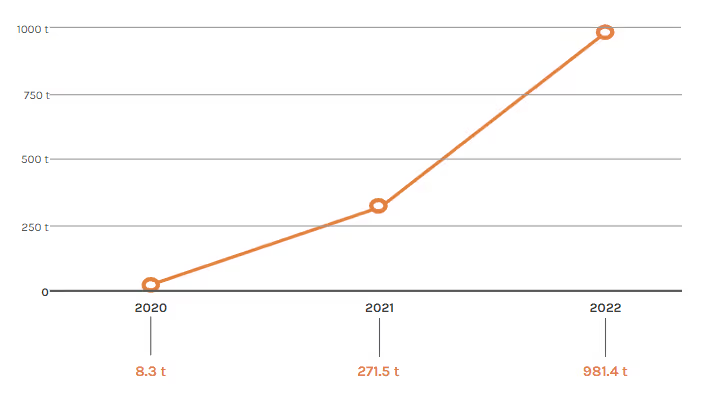
There is a short video introducing project Sueño Azul available on Facebook and Instagram.
Project Laut Yang Tenang
(Bahasa: Calm Seas)
Our final stop is across the Pacific Ocean to Indonesia. rePurpose Global’s project Laut Yang Tengang is located in Bekasi, West Java – home to Bantar Gebang, one of the world’s largest landfills (the landfill is 15 stories high, and home to up to 20,000 people).
Through the project, waste collectors collect plastic bags (made from LDPE) from dumpsites, rivers, households, and smaller collection facilities. This is sent for recycling into pallets for use in supply chain and logistics operations, instead of ending up as marine litter.
In 2022 1,131 metric tons of plastic bags were ethically processed and recycled. This process engaged over 220 informal workers in collection activities, and a further 40 formal workers in transportation and processing.
In 2022 we also onboarded 2 new waste collection centers through an innovative franchise model for waste aggregators.

To find out more about project Laut Yang Tenang, here’s a short introductory video. There’s also a very short film starring one of the waste collectors engaged in the project, made by our brand partners Ocean Bottle who support the project through rePurpose Global.
Verified impact
Those three projects, as with all of rePurpose Global’s projects, are subject to stringent verification processes, with chain-of-custody documentation kept on rePurpose Global’s proprietary reTrace platform. All data is audited, internally and externally to provide further verification.
All projects are also supported to abide by the rePurpose Plastic Credit Protocol and Impact Code, which set out how the verification processes work, but also cover everything from environmental protection policies to social safeguarding policies that guarantee fair treatment, safe working conditions, and gender equality in our projects.

2022: a year of firsts
As rePurpose Global continues to go from strength to strength, and the movement against plastic waste continues to grow, there is no doubt that 2022 was our biggest year yet. It was also a year of firsts. From our first impact project listed on the Verra registry to the first edition of the Plastic Reality Project, here are a few memorable moments from the past 12 months.
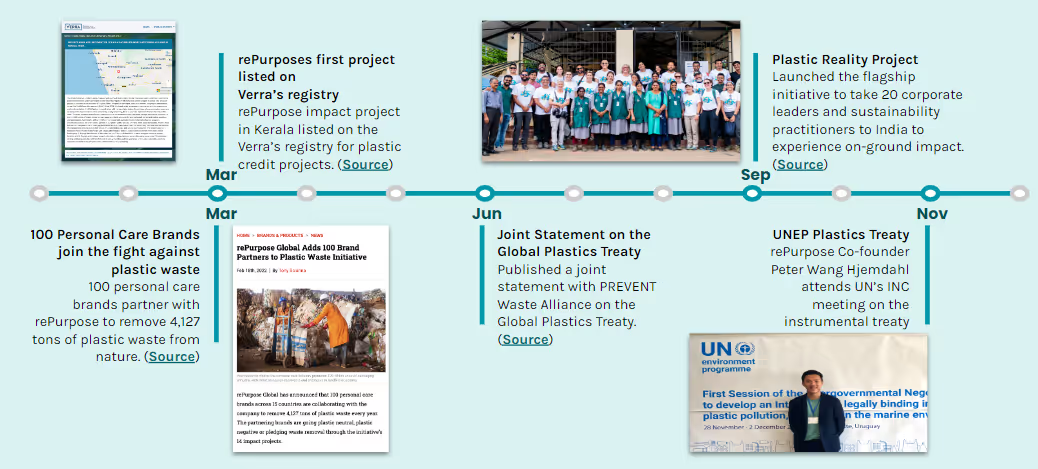
If you haven’t already, why not consider joining rePurpose Global’s coalition in 2023? You can choose a project to support, and generate purpose-driven, waste-fighting, life-changing impact. Get in touch for more information.


.png)
.avif)
.png)
.avif)






